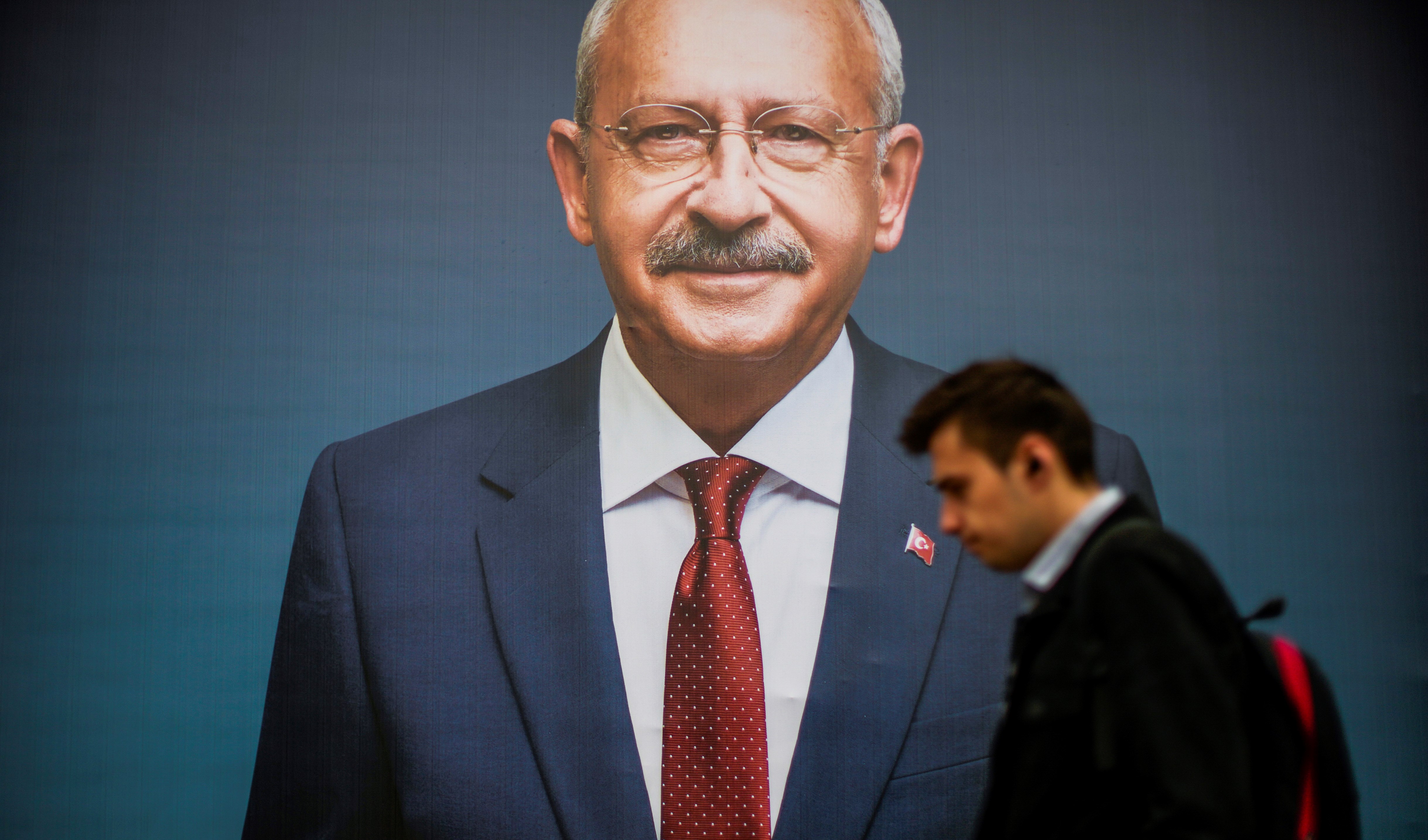Kilicdaroglu; a threat to Turkish ties with Russia and Iran: EurAsia
A new report by a Russian news agency explains that the opposition candidate's policy in Turkey's presidential election risks relations with Russia and Iran by deepening the ties with the West.
-

A man walks past a billboard of Turkish CHP party leader and Nation Alliance's presidential candidate Kemal Kilicdaroglu a day after the presidential election day, in Istanbul, Turkey, Monday, May 15, 2023. (AP)
Turkish Presidential opposition candidate Kemal Kilicdaroglu has been dubbed by the Russian news agency EurAsia Daily a threat to Turkish relations with Russia, Iran, and Azerbaijan.
EurAsia Daily first reminded that in March of 2022, about a year prior to the Turkish elections, Kilicdaroglu compared Turkey's current political system led by Turkish President Recep Tayyip Erdogan, now presidential rival, to Russian President Vladimir Putin and Russian oligarchs who have held various assets in the West. That criticism has been considered by the agency as a "serious attack against Russia."
According to EurAsia Daily, the opposition's candidate "pricked the Russian oligarchs not because he is outraged by their activities aimed at siphoning resources from Russia, but because he wants to blackmail Russian nouveau riches together with Western countries so that they, in turn, put pressure on the Russian leadership."
Read more: Nostalgic for Westernized Turkey, Western media root for Erdogan fall
Such a position offered Russia even more ground to suspect that Kilicdaroglu intends to deepen ties with the West and thus harm current Russian-Turkish relations.
To further add insult to injury, Kilicdaroglu accused Russia, on May 11, of interfering in the Turkish elections via a Tweet which read: "Dear Russian friends, you are behind the montages, conspiracies, Deep Fake content and recordings that were exposed yesterday in this country. If you want to continue our friendship after May 15, keep your hands off the Turkish state. We continue to stand for cooperation and friendship."
Kilicdaroglu's NATO aspirations
Earlier, in May, the opposition leader told the Wall Street Journal that he would, in the event that he becomes President, "protect Turkish investments in Russia and comply with anti-Russian sanctions," while also seeking "to strengthen the role of Turkey as a 'key country' of NATO and to revive the process of joining the European Union."
Moreover, these statements, according to EurAsia Daily, explain why Kilicdaroglu has shown interest in restoring relations with Syria. The agency argued that restoring Syrian-Turkish ties, for the opposition leader, does not mean "that he will be more convenient for Russia than Erdogan," but rather it reflected Kilicdaroglu's commitment to "join the West in confrontation with Russia" by eliminating any points of debate concerning Turkey's refugee crisis.
Read more: Turkish elections authority officially announce round 2, due on May 28
In a similar vein, the Russian news agency noted that if Kilicdaroglu wanted to improve Turkey-NATO ties, then Turkey will inevitably be tasked with engaging in a confrontation with Iran through, at the very least, establishing a commitment by Turkey to comply with a "100% of the Western sanctions against Iran."
As a result of such policies, Turkey could soon, under his leadership, become a safe haven for the anti-Islamic Republic of Iran activists that have been associated with the West. EurAsia Daily explained that Turkey could become a safe place for "all kinds of activists who seek to destroy Iran in the name of the struggle for democracy and rights person."
Overstepping Azerbaijan's interests
Although Kilicdaroglu had previously sent messages of congratulations and sympathy to Azerbaijan, quoting Mustafa Kemal Ataturk’s famous saying: “Azerbaijan’s sorrow is our sorrow, its joy is our joy,” the opposition leader has also vehemently criticized Azeri President Ilham Aliyev as authoritarian.
However, what angered Azerbaijan was Kilicdaroglu's announcement of the revival of the "Great Silk Road." At the time, on May 6, the opposition leader explained that this route would be "neither West nor East - this is the Turkic way" and would link Turkey to China through Iran. In doing so, Kilicdaroglu announced that the project would entirely bypass Azerbaijan, which angered officials in Baku.
Read more: Erdogan's AK Party in the lead in Turkish parliamentary elections

 4 Min Read
4 Min Read








